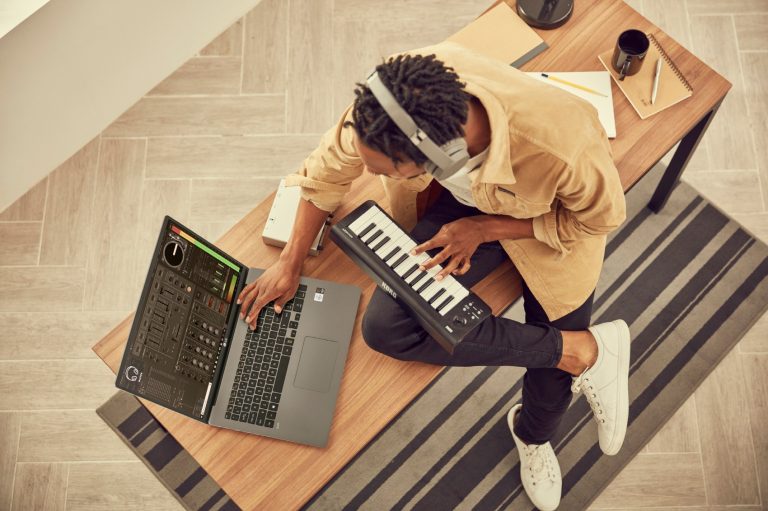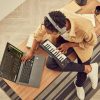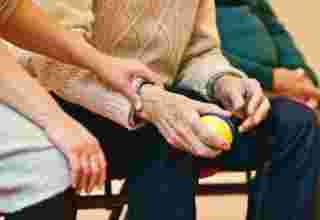
Half of Brits plan to continue their new-found habits and activities in life after lockdown – including creating podcasts, online fitness classes and walking more often.
A study of 2,000 adults found 43 per cent feel they have ‘changed their ways for the better’ – and plan to continue with their improved behaviours even after the restrictions are lifted.
Technology has proven to be the cornerstone of these new habits, as 54 per cent said they couldn’t live without their laptops, 64 per cent wouldn’t manage without their mobile phone and 57 per cent couldn’t do without their TV.
This is due to watching more TV series and films with loved ones or learning a language online while stuck at home.
Starting their own podcast, editing videos and even learning to code are also among some of the skills to be continued after being picked up in recent weeks.
It also emerged a fifth plan on sleeping more than they did before when life returns to normal while one in 10 will look to get more guidance from YouTube tutorials.
The research, commissioned by LG Electronics, found two-fifths feel these new habits are better for their wellbeing, while more than one in four have found it easier to relax and keep a better routine
More than a quarter believe their new ways of living have even saved them money, and 15 per cent said it keeps them busy.
The research revealed that since social distancing began, video calls have become a primary method of keeping in touch with friends and loved ones – with 45 per cent talking to family and friends MORE than they did before social distancing.
Respondents have also been embracing digital birthday celebrations (25 per cent), pub quizzes (20 per cent), and even stag or hen dos (7 per cent).
In fact, the average person is spending two hours and 50 minutes on a week video calls.
And 48 per cent plan to keep this up post-lockdown, or even do it more often, suggesting a more permanent change to the way in which we connect and socialise.
Hanju Kim, IT product director at LG UK, which commissioned the study to celebrate the launch of the new LG gram laptop range, said: “It’s both encouraging and uplifting to see some of the positive things coming out of this challenging period.
“The fact that many people are forming productive and healthy new habits is testament to the nation’s ability to adjust.
“The nation is working from home and has an appetite to continue working flexibly even after offices reopen.
“A big part of this can be attributed to technology keeping us connected.”
The study also found the living room is the number one place in the house for Brits to take a video call (58 per cent), followed by the bedroom (29 per cent), while one in 20 will even look for a privacy in their garden sheds.
Although a third admitted they have had to switch rooms to get a better signal.
It also emerged that although offices and other non-essential workspaces may be shut, half of those polled are still working, with the average professional using at least two different rooms in their home on a typical day.
As well as changing their personal habits, a quarter of those polled, via OnePoll, also plan on working from home more often after offices reopen.
When asked what their ideal space to work from would be in the future, the home was the most popular answer (30 per cent), followed by a fixed office (23 per cent), and outside spaces (9 per cent).
Hanju Kim added: “With the home now acting as the new office for many, eight in 10 Brits admit that they are doing the same or more work than before.
“LG’s mission has always been to put people at the heart of its products; creating technology that simplifies and improves life.
“Boasting the lightest 17” laptop in the world, a 17-hour battery life, and military grade durability, the new LG gram laptop is the latest example of this.”
jQuery(document).ready(function($) {
// We only want these styles applied when javascript is enabled
$(‘.gal_content’).css(‘display’, ‘block’);
// Initialize Advanced Galleriffic Gallery
var gallery = $(‘#thumbs_39333_1’).galleriffic({
delay: 3500,
numThumbs: 12,
preloadAhead: 12,
enableTopPager: false,
enableBottomPager: false,
imageContainerSel: ‘#slideshow_39333_1’,
controlsContainerSel: ‘#controls_39333_1’,
captionContainerSel: ‘#caption_39333_1’,
loadingContainerSel: ‘#loading_39333_1’,
renderSSControls: true,
renderNavControls: false,
playLinkText: ‘Play Slideshow’,
pauseLinkText: ‘Pause Slideshow’,
enableHistory: 0,
autoStart: 0,
enableKeyboardNavigation: true,
syncTransitions: false,
defaultTransitionDuration: 300,
onTransitionOut: function(slide, caption, isSync, callback) {
slide.fadeTo(this.getDefaultTransitionDuration(isSync), 0.0, callback);
caption.fadeTo(this.getDefaultTransitionDuration(isSync), 0.0);
},
onTransitionIn: function(slide, caption, isSync) {
var duration = this.getDefaultTransitionDuration(isSync);
slide.fadeTo(duration, 1.0);
// Position the caption at the bottom of the image and set its opacity
var slideImage = slide.find(‘img’);
caption.fadeTo(duration, 1.0);
},
onPageTransitionOut: function(callback) {
//this.hide();
setTimeout(callback, 100); // wait a bit
},
onPageTransitionIn: function() {
var prevPageLink = this.find(‘a.prev’).css({‘opacity’: ‘0.3’ , ‘display’ : ‘inline-block’, ‘cursor’ : ‘default’});
var nextPageLink = this.find(‘a.next’).css({‘opacity’: ‘0.3’ , ‘display’ : ‘inline-block’, ‘cursor’ : ‘default’});
// Show appropriate next / prev page links
if (this.displayedPage > 0)
prevPageLink.css({‘opacity’ : ‘1’ , ‘display’ : ‘inline-block’, ‘cursor’ : ‘pointer’});
var lastPage = this.getNumPages() – 1;
if (this.displayedPage < lastPage)
nextPageLink.css({'opacity' : '1' , 'display' : 'inline-block', 'cursor' : 'pointer'});
this.fadeTo('fast', 1.0);
}
});
/**************** Event handlers for custom next / prev page links **********************/
gallery.find('a.prev').click(function(e) {
gallery.previousPage();
e.preventDefault();
});
gallery.find('a.next').click(function(e) {
gallery.nextPage();
e.preventDefault();
});
});
ENDS
























